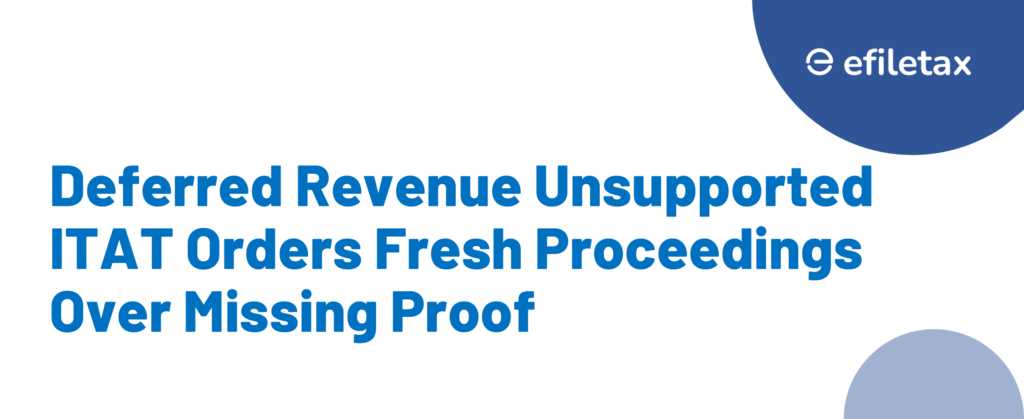
ITAT De Novo Proceedings Deferred Revenue Must Be Substantiated
The Income Tax Appellate Tribunal (ITAT) recently ordered de novo proceedings after finding that the assessee failed to justify the treatment of deferred revenue in the Profit & Loss account. This case highlights a critical aspect of income recognition and accounting compliance under the Income Tax Act, 1961.
What Triggered the ITAT’s De Novo Order?
- The assessee had recorded a significant amount of deferred revenue in the P&L.
- The AO (Assessing Officer) added the entire deferred revenue as taxable income.
- CIT(A) deleted the addition without detailed verification.
- ITAT found both the AO and CIT(A) at fault — one for lack of verification, the other for summary deletion.
ITAT’s Key Observations
- Proper substantiation through client contracts or billing schedules is essential.
Focus Keyphrase Subheading: ITAT De Novo Proceedings – What Taxpayers Should Know
If your books reflect deferred revenue, be aware of these ITAT de novo proceedings implications:
| Area | Compliance Requirement |
|---|---|
| Deferred Revenue | Must be backed by contracts/invoices |
| Accounting Treatment | Align with ICDS and AS-9 (Revenue Recognition) |
| Assessment Stage | Furnish reconciliation between income earned and income received |
| Appeal Strategy | Ensure documentation is placed on record at AO or CIT(A) level |
Legal References
- Income Computation and Disclosure Standards (ICDS) – IV governs revenue recognition.
- Refer to AS-9 by ICAI for general accounting principles.
- In similar past rulings, like ITO v. Nucleus Software, ITAT has emphasized real income theory — only income actually earned is taxable.
Expert View Avoid Adverse Orders with Audit-Ready Records
Tip from a Tax Consultant:
Always match your accounting treatment with contractual terms and document the justification clearly. Don’t wait until assessment to gather proof.”
Why This Matters for Indian Taxpayers
Many businesses — especially in SaaS, consulting, and subscription-based models — report deferred revenue. Any mismatch or unsupported deferral can:
- Lead to unnecessary additions to income
- Trigger penalties and interest
- Result in time-consuming re-assessment or appeal
Final Takeaway
The ITAT’s de novo proceedings order sends a strong message:
📌 No evidence = No relief.
Whether you’re a startup deferring AMC receipts or a large enterprise recording milestone-based billing — ensure:
- Proper documentation
- Contract alignment
- Transparent P&L reporting
FAQs on ITAT De Novo Proceedings
Q1. What is a de novo proceeding in tax cases?
It means the case is sent back to the lower authority (like AO) for fresh evaluation from the beginning.
Q2. Is deferred revenue taxable?
Yes, unless you prove it’s not earned yet. Evidence is crucial.
Q3. How can I avoid similar issues?
Maintain contracts, billing schedules, and notes to accounts justifying deferment.
Summary:
ITAT remands case for de novo proceedings as taxpayer failed to justify deferred revenue in P&L. No evidence = No relief. Learn how to avoid this.